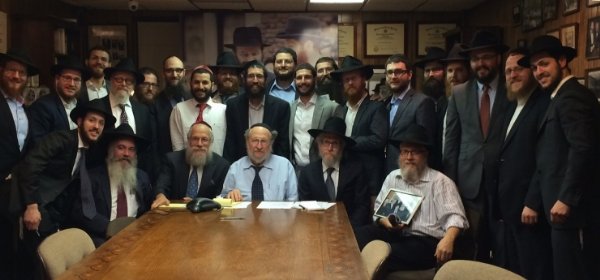
Yom Kippur, which begins Friday at sunset, is the most important date on the Jewish calendar. So in advance of the High Holy Day service, rabbis around the world sometimes pick each other’s brains to make sure they deliver on the year’s most important sermon. The rabbis in the Hecht family have an advantage: They have more than 125 brains to pick.
The Rabbis Hecht serve as pulpit rabbis, run schools and head charities. There’s a scribe in the bunch, and a shohet, a ritual slaughterer. All are members of Chabad, the Hasidic movement famous for its outreach efforts on the streets of Manhattan, the hills of Nepal and any place with a Jew in between. Likewise, Hechts span the globe—hosting Sabbath dinners each week from Hanoi to the Rio Grande Valley—though the majority live in the New York area, where they have been for six generations. “Hecht is the largest last name in our directory,” says Motti Seligson, director of media relations of Chabad.org, “And that’s not counting the guys that married into the family.”
“One Jew got on a boat in the 1880s. We’re all here. That’s it,” as Rabbi Shmully Hecht, who runs the Eliezer Jewish Society at Yale University, summed up his family history. That one Jew, Hirsh Meilich Hecht from Leżajsk, Poland, and his wife,Ita Drezel, had five daughters and two sons; the younger son went on to have six sons—all of whom became rabbis. The “six brothers,” as they are known within the family, collectively had 41 children. Today, they and their children and their grandchildren are proudly continuing the family business.
What December is for retail, early fall is for rabbi-ing. Thus, in a manner similar to the Vatican’s College of Cardinals—well, not exactly—the Hechts gather every year at 824 Eastern Parkway in Crown Heights, Brooklyn, to swap sermons. This year I joined the family conclave. I was told to bring “Advil and oxygen.” Wise advice.
Sitting around a large wooden table in a windowless room—once an office of one of the family’s patriarchs—were 25 rabbis. Most of the rest—another 54 Hechts—called in from cities including Bangkok, Edinburgh and Capetown. The 22-year-old Rabbi Yankel Raskin was the youngest, a member of the family’s seventh generation. The oldest, at 68, and unofficial master of ceremonies, was Rabbi Sholem Ber Hecht.
The mood was exuberant—at one point, the group sang and danced around the table—but their task was serious. Many of these rabbis run congregations where the High Holy Days are the one time of year some people show up. Delivering a sermon that speaks to these once-a-year synagogue-goers—and makes them want to reconnect to their Judaism—is critical. The rabbis’ job, as Eli Hecht of Lomita, Calif., put it, is to “light up the fire of Yiddishkeit.” Another, quoting Maimonides, said that “one good deed can tip the scales to bring the messiah.” When the messiah might be on tap, the sermonizing stakes are high.
Jumping back and forth between those in the room and those calling in, the rabbis covered a range of topics. Many offered jokes and parables. One quoted Pascal. Another drew an analogy between the tensions within the Jewish community to friction between iPhone users and Android fans. His message: Jews are all one family.
Many reflected on the past year—5774 according to the Hebrew calendar. While the rabbis seem to be perpetual optimists, the picture was bleak: the stunning rise of anti-Semitism in Europe, the murder of three Israeli teenagers that led to this summer’s war against Hamas, and so on. Rabbi Motty Liberow, from Melbourne, Australia, said he would discuss “how to live proudly in a world where Jews are so often alone.” Staring down from the walls were photographs of the six brothers, most prominently Jacob J. Hecht, posing with machers like Bobby Kennedy andGeorge H.W. Bush. Hecht, who died in 1990, was a right-hand man for the Chabad rebbe, one of the most influential Jewish figures in modern history.
Jacob Hecht’s eldest son, Sholem Ber, remembers when his father and his brothers would gather before Rosh Hashana, relying on the eldest, Shlomo Zalman, “the sage who always came up with brilliant ideas.” In the 1990s, the next generation took up the meetings, which became increasingly official. But the crowdsourcing stretches beyond the one evening.
“In preparing for Yom Kippur, I am daily in touch with several of my brothers,” Sholom Ber told me this week. Ultimately, “it’s more than just being able to share ideas,” Rabbi Asher Hecht said. “It’s energizing to know that you have brothers and cousins around the world doing what you’re doing.”


6:39 PM in New Brunswick, NJ
Shabbat Ends 7:42 PM
Friday, 3 May 2024
Parashat